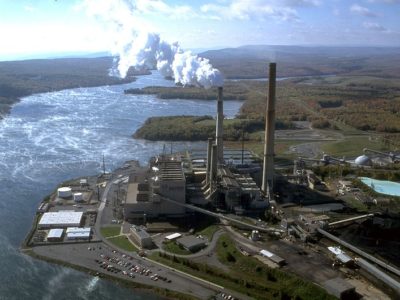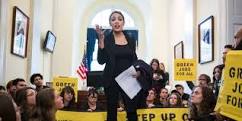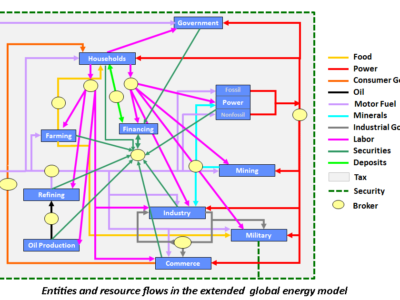Federal Climate Policy
EPA Shouldn’t Roll Back Coal Power Plant Emissions Standard, Conclude Experts in Electrical Grid Management and Pollution Control Technology Innovation
Emmett Institute Faculty File Two Comment Letters on Behalf of Experts, Demonstrating Flaws In Proposed Rollback of New Source Performance Standard for New Coal-Fired Power Plants
In 2015, EPA set greenhouse gas emissions standards for new coal-fired and natural gas-fired power plants under the Clean Air Act’s New Source Performance Standards program, Section 111(b) of the Act. These standards ensure that new plants can be built only if they incorporate state-of-the-art emissions controls. Unfortunately, in late 2018, the Trump Administration EPA proposed …
CONTINUE READINGIf You’re Not At The Table, You’re On The Menu
Why Has Labor Attacked The Green New Deal?
One more entry in the “Not Helpful” Department: The AFL-CIO, the national arm for U.S. labor unions, offered a critical assessment of the Green New Deal, warning that the ambitious plan to combat climate change could adversely affect U.S. workers. In a letter last week to Sen. Edward J. Markey (D-Mass.) and Rep. Alexandria …
Continue reading “If You’re Not At The Table, You’re On The Menu”
CONTINUE READINGClimate Change in the Political Spotlight
Climate change has been a low-visibility political issue. That may be changing.
Generally, climate change doesn’t get much attention as a political issue. That may be changing now. And if it is, that could have important implications. One sign of the times is Jay Inslee’s run for the Presidency. He may not be at the top of the lists of prospects, but he’s an established, well-respected political …
Continue reading “Climate Change in the Political Spotlight”
CONTINUE READINGDo Impossible Regulatory Deadlines Cause Faster Progress?
A: Maybe, but only in a roundabout way. (And at a cost.)
Just about nobody who’s knowledgeable in the field thinks the U.S. electric grid can be made carbon free in ten years. Having spent the past two years lambasting the Trump Administration for ignoring the experts, I’m loathe to disagree with the expert opinion on this one. But even if the ten-year deadline set by supporters …
Continue reading “Do Impossible Regulatory Deadlines Cause Faster Progress?”
CONTINUE READINGUCLA Law’s Ann Carlson Interviewed on CBS’s 60 Minutes Discussing Juliana v. U.S., Landmark Climate Change Lawsuit
Segment Provides Legal Context for Groundbreaking Children’s Climate Case
Our colleague Ann Carlson appeared on 60 Minutes this past Sunday for a lengthy on-camera interview with Steve Kroft, discussing the Juliana v. U.S. lawsuit filed by Our Children’s Trust. Begun in 2015, the lawsuit has survived several appeals so far, and is headed to oral arguments in June at the U.S. Court of Appeals for the Ninth Circuit in Portland, Oregon. …
CONTINUE READINGThe Potential Benefits of Declaring a Climate Emergency
The idea deserves serious consideration. There actually could be some very tangible benefits.
I have a confession: When I started thinking about the possibility of a climate emergency declaration, it was mostly as a counterpoint to Trump’s possible (now a done deal) declaration of an immigration emergency. As I’ve thought about it, however, it seems to me that there are enough potential benefits to make the idea worth …
Continue reading “The Potential Benefits of Declaring a Climate Emergency”
CONTINUE READINGThe GOP’s Climate Views Are Thawing
Significant parts of the GOP seem to be leaving Trump behind on the climate issue.
There were three interesting stories about climate politics in the papers today: one about Trump, one about other Republicans, and one about both. What these stories tell us is that part of the GOP is coming to terms with reality; Trump not surprisingly is not. First, as to Trump. As you may have noticed, Trump …
Continue reading “The GOP’s Climate Views Are Thawing”
CONTINUE READINGScoping Out the Green New Deal
How would we go about decarbonizing the most needy U.S. states?
Progressives are calling for a Green New Deal. The details are still very fuzzy, despite the House resolution introduced by Markey and Ocasio-Cortez. That proposal as a ten-year timetable to eliminate carbon, which is highly unrealistic. Nevertheless, it’s worth thinking about what an all-out effort to decarbonizing the economy would look like. The Green New …
Continue reading “Scoping Out the Green New Deal”
CONTINUE READINGBottoms-Up! An Emerging New Governance System (4)
We can think of the energy system as a kind of ecosystem, and renewables as an invasive species.
As I’ve discussed the earlier three posts in this series, it is possible to imagine a cycle of positive feedback, in which the history of past climate efforts increases the likelihood of future ones and even draws more jurisdictions into the effort. But it is also possible to imagine that bottom-up efforts might not catch …
Continue reading “Bottoms-Up! An Emerging New Governance System (4)”
CONTINUE READINGBottoms-Up! An Emerging New Governance System (3)
Bottom-up strategies can ultimately pave the road for stronger international agreement.
It is difficult to measure the extent of positive feedback between climate initiatives. But it seems evident that such feedback does exist. A major climate initiative in one jurisdiction seems to encourage climate action elsewhere. This makes climate action a more appealing prospect for any individual jurisdiction, because by acting it can increase climate actions …
Continue reading “Bottoms-Up! An Emerging New Governance System (3)”
CONTINUE READING












